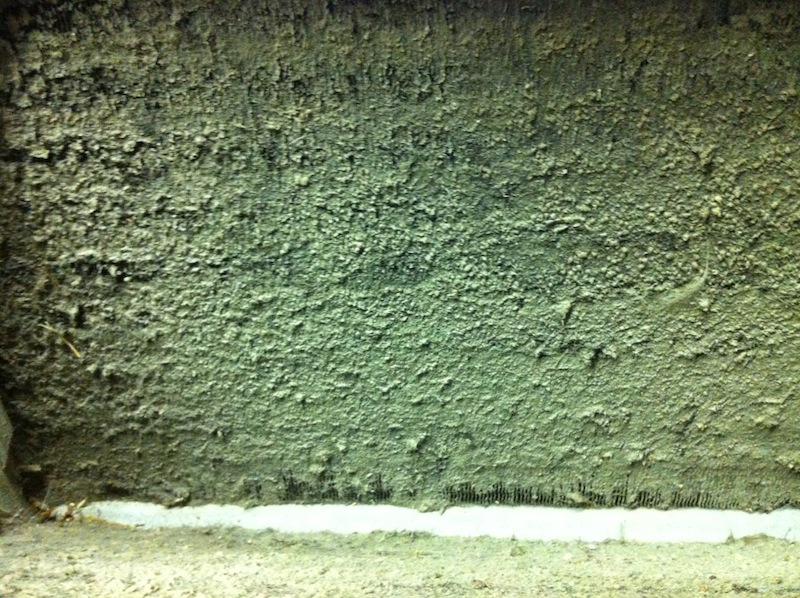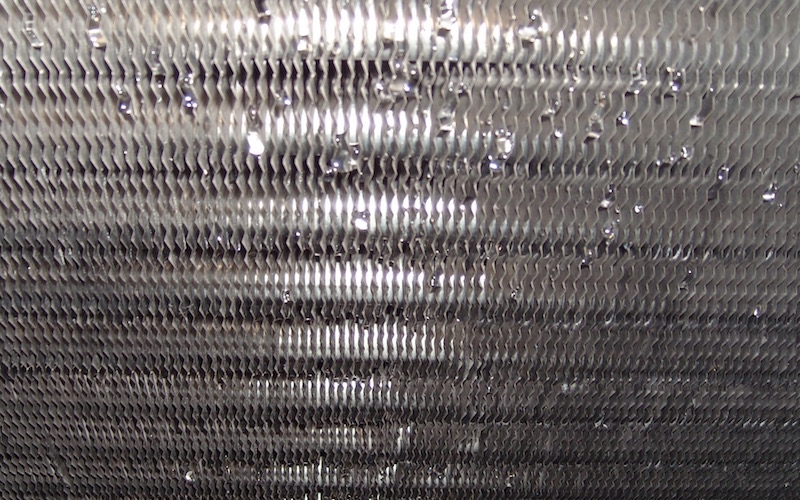Skin Flakes in Your Air Conditioner

I never read Robert Fulghum’s book, All I Ever Needed to Know I Learned in Kindergarten, but I have a clear memory of learning about one thing in the book: Most of the dust floating around our homes is actually made up of skin flakes. Now, I don’t know if that memory is accurate (maybe it wasn’t from Fulghum’s book?), but I have found out that this tantalizing “fact” about dust and skin flakes isn’t true. Household dust, it turns out, isn’t made up largely of skin flakes. (See this article about a 2009 study on household dust.)
Household dust and air conditioner coils
That doesn’t really let skin flakes off the hook, though. There’s still enough of it floating around that it can cause a problem if it finds its way into your air conditioner. HVAC technicians deal with dirty coils all the time. See that photo at the top? That’s a really bad one. Almost no air can get through all that gunk. I did a kind of postmortem on that coil a few years ago, but my focus was on the performance of the air conditioner, not indoor air quality.
Just so you know what an air conditioner’s evaporator coil is supposed to look like, here’s a photo of a nice, clean coil. No gunk. No sludge. Just a bit of water that had condensed on the cold metal fins on that summer day in Atlanta. Air can move through the coil.

Now look again at the photo at the top of this article. When dirt gets pulled into the duct system and can make it all the way to the coil, that’s what can happen over time. It’s a mix of all kinds of things. A lot of it is particles (pollen, dirt, dead bug parts…) that find their way into the house from outdoors. Another big chunk is carpet fibers in homes with carpet. Then there’s pet dander. And skin flakes.
When that stuff gets pulled into an air conditioner and finds a wet coil, it sticks. Over time, that gunk creates its own little ecosystem because guess what: There’s life in them there particles! My friend Kristof Irwin has discussed this issue of the microbiome in his Building Science Podcast more than once. (And that’s only one reason you should go listen and subscribe!)
The problem with skin flakes
At the end of 2017, researchers in Hong Kong published a paper titled, Skin squames contribute to ammonia and volatile fatty acid production from bacteria colonizing in air‐cooling units with odor complaints. Squames are what I’ve been calling flakes; they’re pieces of skin that fall off our bodies all the time. The plain English translation of the title would be: Skin Flakes and bacteria combine in your air conditioner to create bad odors. (Here’s a nice summary of the paper.)
Skin flakes have proteins in them. Bacteria, which are everywhere, chow down on the proteins. An eventual waste product from this process is ammonia. So if you ever smell something like urine coming from the air conditioner, this could be the reason.
But wait…there’s more! In addition to the proteins, skin flakes also have fatty acids. That leads to another bacteria chow-down with a different waste product smell: body odor.
What can you do to keep these urine and BO smells from emanating from your air conditioner? It’s pretty easy. Make sure your return ducts are sealed and that you have a good filter with no bypass. Just a few months ago I wrote about seven reasons your filter isn’t doing its job. Fix those problems and use a good, high-MERV filter designed properly to have a low pressure drop.
Related Articles
The Sludge That Kills — Post Mortem of an Air Conditioner
7 Reasons Your Filter Isn’t Improving Your Indoor Air Quality
The Path to Low Pressure Drop Across a High-MERV Filter
NOTE: Comments are moderated. Your comment will not appear below until approved.
This Post Has 4 Comments
Comments are closed.

my game room is cooled by a
my game room is cooled by a dedicated ac, no pets, no carpet, no windows open, so the only thing that can produce “dirt” is me, and seing that all test i’ve seen from studies/labs outside the US stating its mainly skin particles, i can confirm it.
outside that i virtually bad similar room setups in different locations and even different countries, yet color/size of the particles was always the same.
Not even talking about the fact that the bacteria causing odors live on our skin and wont survive long enough to cause smell.
One reason why sweat doesn’t smell until the bacteria actually processed it.
Is the game room under
Is the game room under negative pressure? If the room is negative couldn’t the dirt be anything from behind your walls or from the attic?
Is that why we have customers
Is that why we have customers complain about “the dirty sock smell”? Is it due to the body odor from squames.
Do you happen to have any
Do you happen to have any anecdotal evidence on if air sealing measures reduces particle build-up on/in HVAC filters?